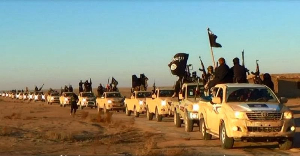You Reap What You Sow: The Rise of ISIS and the Sectarian Dimension of the AKP’s Foreign Policy
By Halil Gürhanlı (vol. 7, no. 12 of the Turkey Analyst)
As the the Sunni militant group, the Islamic State of Iraq and al-Sham (ISIS), keeps expanding its sphere of influence deeper into Iraq, the Justice and Development Party (AKP) government of Turkey is facing a very real fear. Its neo-Ottoman dream of becoming a regional hegemonic power revered by ideologically affiliated governments in the Middle East is turning into a nightmare. The rise of ISIS is a painful reminder for Turkey that its Middle Eastern policies are bound to cause unpleasant side effects.

Erdogan's Volatile Authoritarianism: Tactical Ploy or Strategic Vision?
By Gareth H. Jenkins (vol. 5, no. 23 of the Turkey Analyst)
In recent months, Turkish Prime Minister Recep Tayyip Erdoğan has made a string of highly controversial public statements which appear indicative of an authoritarian mindset. For some, they are a sign that Erdoğan is discarding the patina of democratic pluralism of the last ten years and reverting to the dogmatic intolerance of his early political career. Others claim that Erdoğan’s provocative statements are merely a tactical maneuver, a ploy to distract public attention from government failures and embarrassments, and that he has no intention of acting upon them.
What the Sledgehammer Sentences Mean
By Halil M. Karaveli (vol. 5, no. 18 of the Turkey Analyst)
The sentences in the Sledgehammer trial demonstrate the subjugation of the military to civilian, democratic, legal authority. But at the same time, it is not in the interest of the government of the Justice and Development Party (AKP) that the officer corps is further demoralized. Prime Minister Recep Tayyip Erdoğan no longer has an interest in wielding a sledgehammer against the military. The outcome of the trial of the generals must be viewed against the backdrop of the new power struggle that rages in Turkey, between the AKP and the movement of Fethullah Gülen.
Erdogan Aims to Retain Control Over the AKP After He Leaves the Party Leadership
By M. Kemal Kaya (vol. 5, no. 17 of the Turkey Analyst)
Turkey’s ruling Justice and Development Party (AKP) will hold its fourth party congress on September 30, 2012. Although Recep Tayyip Erdoğan will have taken care to design a party organization that he can – presumably – continue to control from the presidential palace, and although the next leader of the AKP is likely to be a person that does not seek to rival the stature of Erdoğan, Turkey’s most successful party nonetheless faces an uncertain future.
Fighting Blind: the AKP's Increasingly Hardline Kurdish Policy
By Gareth H. Jenkins (vol. 5, no. 17 of the Turkey Analyst)
On August 28, 2012. Selahattin Demirtaş, the co-chair of the pro-Kurdish Peace and Democracy Party (BDP), declared that the Kurdistan Workers’ Party (PKK) had usurped the authority of the Turkish state over an area of 400 square kilometers of the district of Şemdinli, close to the Iraqi border. The claim was exaggerated, in terms of geographical extent and the degree of PKK control. But there is little doubt that in recent months the Turkish security forces have been losing ground on the battlefield. However, even if the military eventually regains the upper hand, in the longer term Prime Minister Recep Tayyip Erdoğan’s insistence on pursuing hard-line policies seems likely only to strengthen the PKK, More critically, the continuing rise in anti-Kurdish racism and ethnic violence suggests that, whatever happens in the PKK insurgency, an even more important war could be lost.



